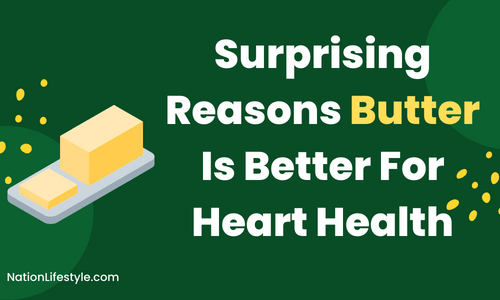For years we’ve been told to stop eating natural, traditional fats like butter because they are said to be bad for our hearts. Instead, we’ve been advised to substitute vegetable oils and margarine for butter. But is it true? Is it good advice? Or might it be dangerous to follow that advice?
In today’s article we’re going to look at some of the surprising reasons why butter and other traditional fats are a better idea than modern vegetable oils.
Saturated Fat Never Was Bad
Since the 1960s the American Heart Association has been warning us that saturated fat (such as is found in many natural fats) is harmful. But the evidence was always weak. In recent years much of the bad science has been outed and natural fats have been shown to be healthy after all.
Up until the beginning of the 1900s Americans ate no vegetable oils. Instead, they ate about 35 percent of their calories from butter, lard, and other traditional fats. And up until the 1900s rates of heart disease were extremely low.

What changed in the 1900s was that industrial processes were invented that allowed companies to extract oil from seeds. Initially cottonseed was used. Cottonseed oil was a huge boon to the cotton industry, and companies like Proctor and Gamble promoted their new cottonseed oil products as being “healthy”. But there was no evidence that they were healthy at all.
Cottonseed was eventually replaced with soy, which was cheaper to produce. Then, in 1970, canola was invented by removing toxins from rapeseed.
Topics To Read:
- Discover a Common Food Proven to Help Men Lose Weight and Improve Heart Health
- On the Issue of Milk – Raw Milk in Its Pure form is a Wonder Drink
Since the 1960s many studies have been conducted that attempted to prove that saturated fat in traditional fats was unhealthy and that vegetable oils were a healthy alternative. Many of those studies were funded by the producers of seed oils.
Not surprisingly, many studies blamed saturated fat for poor health. They also claimed that vegetable oils were good for health. But the studies have turned out to be distorted.
The studies showing that saturated fat were harmful failed to take into account the differences between groups of people who eat lots of saturated fat and those who do not. It turns out that when all other factors are considered, saturated fat is not harmful.
In fact, some studies conducted by some of the most respected researchers from Harvard found that it was never saturated fat that was the problem. It was a lack of fruits and vegetables. Saturated fat, however, is just fine. It should never have been blamed. Instead, we should have been told to eat more fruits and vegetables.
The Dangers of Trans Fat
One of the biggest dangers in replacing traditional fats like butter with vegetable oil products is trans fats. Chemical processing used to make vegetable oil margarines creates new types of trans fats, which are fats that have been structurally twisted. And the new types are harmful for humans. In fact, trans fats found in margarines have been shown to cause heart disease! The link between margarine trans fats and heart disease is so strong that many governments, including some states in the U.S., have passed laws limiting their use.

The Other Dangers of Vegetable Oils
Natural, traditional oils and fats produced from fruits and nuts such as olive and coconut oils are healthy and safe. They have stood the test of time. A large percentage of the human population eats a huge percentage of their daily calories from coconut oil, for example, and they have low rates of heart disease. And olive oil has been used extensively in the Mediterranean for a long time without any health problems.
But other oils called vegetable oils are mostly seed oils from things such as soy, corn, canola, and safflower. These oils are different than traditional fats in a couple of important ways. First of all, natural, traiditional oils and fats are naturally pressed or otherwise naturally occurring. For example, olive oil can be pressed from olive mechanically and butter is churned from natural cream. But seed oils are extracted using chemical solvents and have to be bleached and further chemically altered to be used. Although most of those solvents and chemical residues are removed from the end product, small amounts remain. Do you really want to be eating hexane?
Topics To Read:
- Music Keeps Brain Healthy Plus More Surprises [Effects of Music on Human Behavior]
- Amazing Health Benefits Of Getting Away
- Adrenal Fatigue – Stress Syndrome
- Proven ways to Naturally Increase your Energy Levels – A Crazy Simple Solution to Low Energy
- Learn About this Surprising Danger to Men’s Fertility – Tips to Increase Fertility
- Recent Discoveries Show How to Reverse the Silent Killer Affecting 90 Percent of Men
- Right Types of Exercise or The Wrong Types of Exercise | A Complete Guide
Another key difference – and this is what organizations such as the American Heart Association (AHA) think is so great – is that seed oils contain very large amounts of a type of fat called omega 6 fat. Traditional fats contain very little omega 6 fat. So the large scale use of seed oils for the past century has been an experiment to find out what the effects are of swapping natural fats for lots of omega 6.
The AHA insists that there is great evidence showing that omega 6 fats are healthy. But consider this. Heart disease has increased in parallel with the increase of omega 6 fats in human diets. If omega 6 fats are truly heart healthy, how do you explain that? The AHA certainly doesn’t explain it. It just claims that studies prove that omega 6 is heart healthy.
What do the studies really show? We know what the AHA says. But what do the actual researchers doing the work say? Some of the key researchers whose work has been used by the AHA as “proof” of the benefits of omega 6 fats disagree with the conclusions. In fact, some of them say that the AHA has completely misrepresented science. Some of them even say that increasing omega 6 intake may increase heart disease.
Conclusion
So what should you eat? If you want to take the AHA’s word for it, you should stop eating butter even though butter has never been proven to be harmful and even though when Americans ate the most butter (and least seed oil) heart disease was at its lowest. The AHA also says that you should eat lots of seed oils even though both trans fats and omega 6 fats have been shown to increase heart disease.
But if you want to listen to what history and science have to say, then the message is clear. Eat natural, traditional fats like butter in moderation and skip the seed oils. And to make the biggest improvement in heart health, eat more fruits and vegetables. Along with that, you can do some other sensible things like walk, sleep enough, and nurture meaningful friendships. Do these things, and your heart will thank you.
